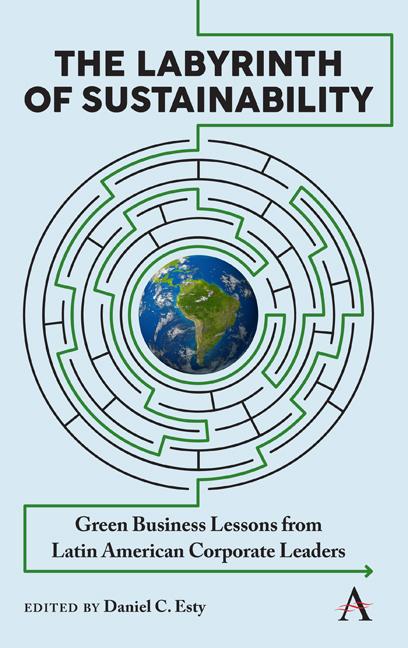Book contents
- Frontmatter
- Dedication
- Contents
- List of Illustrations
- Acknowledgments
- Notes on Contributors
- Introduction
- Chapter 1 Water Conservation in Scarcity Conditions: Corporate Sustainability at Mexico's FEMSA Group
- Chapter 2 Walmart Mexico: Clean Energy to Reduce Costs and Improve Corporate Image
- Chapter 3 Grupo Vanguardia Revitalizes Plastics Recycling in Honduras
- Chapter 4 Nissan Mexicana's Renewable Power Partnership
- Chapter 5 Tecnosol Follows the Sun
- Chapter 6 Rizek Pushes the Dominican Republic Cocoa Industry toward Sustainability
- Chapter 7 Centrosur Leads the Way to Sustainability in Ecuador
- Chapter 8 A Resilient World: Bavaria Builds Its Case on Water
- Chapter 9 Grupo Herdez Takes the Initiative in Mexico's Food Market
- Chapter 10 Chile's Las Palmas Avocado Orchard: Water Consumption Reduction in Agriculture
- Chapter 11 Mabesa: Increasing Global Competitiveness with Eco-friendly Disposable Products
- Chapter 12 Water Use Efficiency Initiatives in Nestlé's Value Chain and the Implications of the Company's Business Model
- Notes
- Index
Introduction
Published online by Cambridge University Press: 29 May 2019
- Frontmatter
- Dedication
- Contents
- List of Illustrations
- Acknowledgments
- Notes on Contributors
- Introduction
- Chapter 1 Water Conservation in Scarcity Conditions: Corporate Sustainability at Mexico's FEMSA Group
- Chapter 2 Walmart Mexico: Clean Energy to Reduce Costs and Improve Corporate Image
- Chapter 3 Grupo Vanguardia Revitalizes Plastics Recycling in Honduras
- Chapter 4 Nissan Mexicana's Renewable Power Partnership
- Chapter 5 Tecnosol Follows the Sun
- Chapter 6 Rizek Pushes the Dominican Republic Cocoa Industry toward Sustainability
- Chapter 7 Centrosur Leads the Way to Sustainability in Ecuador
- Chapter 8 A Resilient World: Bavaria Builds Its Case on Water
- Chapter 9 Grupo Herdez Takes the Initiative in Mexico's Food Market
- Chapter 10 Chile's Las Palmas Avocado Orchard: Water Consumption Reduction in Agriculture
- Chapter 11 Mabesa: Increasing Global Competitiveness with Eco-friendly Disposable Products
- Chapter 12 Water Use Efficiency Initiatives in Nestlé's Value Chain and the Implications of the Company's Business Model
- Notes
- Index
Summary
Business leaders in the twentieth century focused on delivering shareholder value. They paid attention to top-line growth and bottomline success. Environmental degradation emerged as a concern in the 1990s across the corporate world, including in Latin America. But while pollution impacts, ecosystem vitality, and natural resource management became top-tier policy concerns in recent decades, those topics remained secondary priorities for almost all companies until very recently. Executives in major enterprises viewed environmental matters as a regulatory compliance issue to be dealt with by lawyers and engineers.
Business attitudes toward the environment— encompassing energy use and the broad range of topics associated with sustainability— have now shifted dramatically. Today's leading executives understand that their companies have social responsibilities. Of course, they are still accountable to their shareholders. But understanding that business success cannot be achieved at the expense of society means companies must also answer to an array of other stakeholders— from customers to employees to the communities in which they operate and, indeed, to society more broadly.
This obligation takes on new importance in the context of emerging planetary boundaries. As Johan Rockström and his colleagues at the Stockholm Resilience Center have highlighted, human-induced stress on various Earth systems threatens to push the planet beyond its “safe operating space” along a number of dimensions— from climate change to biodiversity to water availability and ocean acidification. In addition to these ecological threats that may impinge on the quality of life on Earth, other researchers have identified a set of social strains— including poverty, income inequality, and evolving employment structures— that threaten the fabric of our communities. Where at one time this entire agenda would have been seen as the purview of governments, business today shares responsibility for society's response. As Peter Bakker, president of the World Business Council for Sustainable Development (WBCSD) and former CEO of the Dutch logistics company TNT, likes to say, “Businesses cannot succeed in societies that fail.”
Simply put, a sustainability imperative now looms over the business world. This book offers guidance on how to manage the various dimensions of this sustainability agenda— providing lessons from a dozen case studies across Spanish-speaking Latin America and the sustainability management literature more generally. Of course, the optimal response to sustainability will vary by industry and geography.
- Type
- Chapter
- Information
- The Labyrinth of SustainabilityGreen Business Lessons from Latin American Corporate Leaders, pp. 1 - 18Publisher: Anthem PressPrint publication year: 2019

